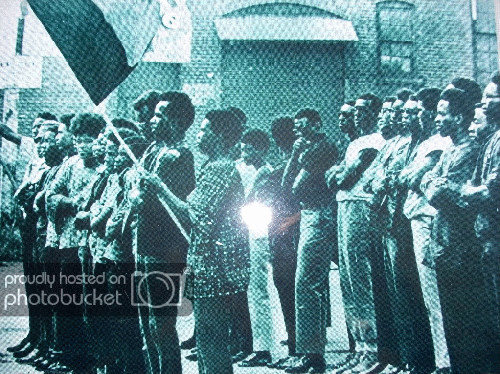| Back OpEd News | |||||||
|
Original Content at https://www.opednews.com/articles/Lessons-From-Black-History-by-Bill-Fletcher-Jr-100216-791.html (Note: You can view every article as one long page if you sign up as an Advocate Member, or higher). |
|||||||
February 16, 2010
Lessons From Black History: Understanding How Change Happens
By Bill Fletcher Jr
Has the US become even more divided in the Obama era? Since race is hard-wired into capitalism, we see a new coding of the divisions between Americans today. But too many Obama supporters have become complacent because they feel they have an ally in the White House. History shows issues-based movements are where we should focus our efforts, not any one political figure.
::::::::
(source)
As part of the Roosevelt Institute's weeklong "Lessons from Black History" series, running on the New Deal 2.0 blog from Feb. 15-19, I was asked to reflect on what lessons from the past should be heeded to advance social justice in the future. Here's my take.
During the 2008 Presidential election campaign, then-Senator and candidate Barack Obama was asked who Dr. Martin Luther King would have supported had he been alive. Obama said that King would probably have supported no one but would have been pushing all the candidates on the movement's issues.
If there is one critical lesson from the last year, it is that in the absence of social movements -- and particularly social movements with dynamic and audacious leadership -- political change does not happen in a progressive direction irrespective of the intent of elected leaders. This is a lesson that emerges from the history of the Black Freedom Movement and the challenges that it offered to both Democratic and Republican office holders.
In the first year of the Obama administration, many of the President's supporters have fallen prey to the notion that one great individual brings about change. The level of magical thinking that exists among so many Obama supporters has led to paralysis when, in the face of opposition to his overly moderate policies from the political Right, the Obama administration has repeatedly blinked and not delivered sufficiently on the change that we have believed in.
The Black Freedom Movement's history demonstrated that irrespective of whether there is a "friend" in the White House, the movement itself must have its own independent program and agenda. This agenda must be advanced in such a way that it puts heat on those in power even to the point of being excluded from the halls of power. The Black Freedom Movement, or at least major sections of it, recognized that it does no good to be in the halls of power if all one is doing is collecting autographs.
The second lesson we can draw from our history is that racism is hard-wired into U.S. capitalism and is not easily removed -- certainly not simply or solely through the election of a person of color to even the highest of offices. The immediate "post-racial" discourse following the election of President Obama collapsed in the face of the racist, irrational attacks that emerged from the political right as it maneuvered to energize an anti-Obama and anti-progressive movement. Using coded phrases and narratives -- exemplified by the activities of the idiotic conspiracy theorists of the so-called "Birther Movement" (which challenges the legitimacy of President Obama's claim to U.S. citizenship), or the Voodoo posters of President Obama that surfaced at anti-Obama rallies, or the rapid accumulation of guns and ammunition by whites in fear of the future, or the chant from largely white audiences that it was time to "reclaim America" -- the political right has made race central to their organizing approach and message.
Unfortunately, too many Obama supporters substituted their hopes for a racially altered USA for the reality of a badly fractured USA, where race remains the trip-wire of our politics. That trip-wire cannot be avoided or ignored; it can only be severed at the source. This is done by taking on both the myths and the racist differentials in treatment that have divided this country since European settlers first landed in North America, marched inland removing and annihilating Native Americans, and brought Africans to these shores -- first as indentured servants and later as slaves.
We cannot afford to ignore either of these lessons, both of which emerge from the history of the Black Freedom Movement. To put it another way, ignoring these lessons is done at our own peril, and the peril of this country's future, which could, rather than be one of hope, end in a right-wing nightmare.
Authors Bio:
Bill Fletcher, Jr., is the Chairman of the Board of Directors for the International Labor Rights Forum, Executive Editor of The Black Commentator and founder of the Center for Labor Renewal. A longtime labor, racial justice and international activist, he is the immediate past president of TransAfrica Forum, a national non-profit organization organizing, educating and advocating for policies in favor of the peoples of Africa, the Caribbean and Latin America. Fletcher is also a founder of the Black Radical Congress and is a Senior Scholar for the Institute for Policy Studies in Washington, DC.
Fletcher is the co-author (with Fernando Gapasin) of Solidarity Divided, The Crisis in Organized Labor and A New Path Toward Social Justice (University of California Press). He was formerly the Vice President for International Trade Union Development Programs for the George Meany Center of the AFL-CIO. Prior the George Meany Center, Fletcher served as Education Director and later Assistant to the President of the AFL-CIO.
